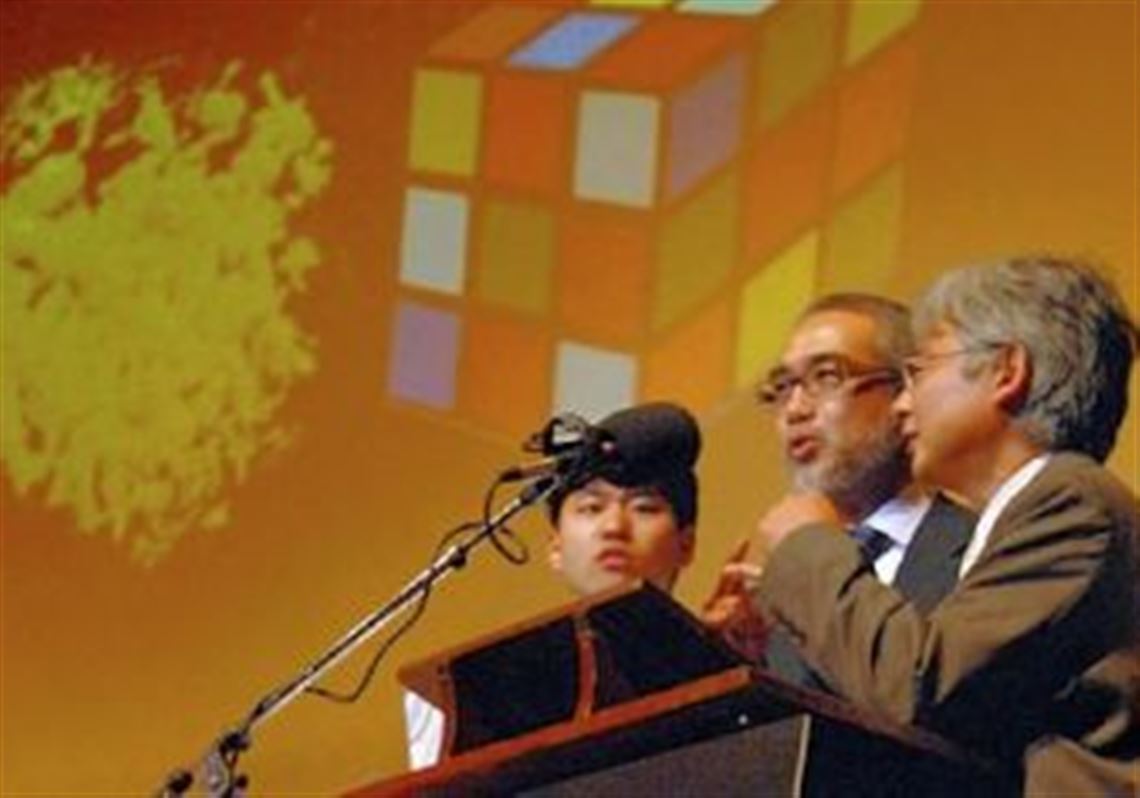Some terrible things have happened in Octobers past -- a 1929 stock market crash triggered the Depression, the 1962 Cuban missile crisis brought the threat of nuclear Armageddon, Francisco Cabrera's single in the National League playoffs ended the Pirates' last winning season -- but we nonetheless treasure the month for one reason: the Ig Nobel Prize announcements.
In a ceremony held for 18 straight years at Harvard, the Annals of Improbable Research recognizes the scientists and inventors and others who have come up with some of the most ridiculous ideas you've never heard.
The winners present lectures on their subjects, but with a time limit of 24 seconds. Winners of actual Nobel Prizes take part in the shenanigans, including a "Win-a-Date-With-a-Nobel-Laureate Contest." (Sign me up for Lech Walesa -- still hot at 65!)
A crowd of 1,200 last Thursday packed a hall for the festivities, including the premiere of a mini-opera, "Redundancy, Again," celebrating the theme of this year's awards ceremony: Redundancy. Again.
'Honey, I was in heavy research. Honest.'
It can be hard to pick a favorite among the 10 Ig Nobel recipients (highlighted at improbable.com), but if The Morning File had to pick one, it would be the Economics Prize awarded to a group of University of New Mexico researchers.
Their published work in the journal Evolution and Human Behavior was titled "Ovulatory Cycle Effects on Tip Earnings by Lap Dancers: Economic Evidence for Human Estrus?" The 24-second lecture version of their finding explains that exotic dancers make more money when they are at peak fertility. We would like to receive a grant to attempt to verify the research.
Among other winners:
• The Biology Prize to French researchers who determined fleas on a dog jump higher than fleas on a cat.
• The Physics Prize to researchers in California "for proving mathematically that heaps of string or hair or almost anything else will inevitably tangle themselves up in knots."
• The Nutrition Prize to European collaborators for their study: "The Role of Auditory Cues in Modulating the Perceived Crispness and Staleness of Potato Chips." They found that if you electronically modify the sound of a potato chip as people bite into it, they will think it's fresher than it really is. Genius!
Peace be with you (and your plants)
The Nobel Prizes -- the ones you're used to hearing about instead of the Ig Nobels -- are to be handed out in Sweden and Norway starting today. Maybe you already placed bets on them. The Peace Prize is often viewed as the big enchilada, to be awarded Friday, and we're guessing that President Bush is rated a very long long-shot this year. (Theodore Roosevelt, Woodrow Wilson and Jimmy Carter are the only U.S. presidents so honored, though not necessarily while in office.)
The Igs also give out a Peace Prize. This year's went to the Swiss Federal Ethics Committee on Non-Human Biotechnology for adopting the legal principle that plants have dignity. According to a blogger on Thursday's ceremonies for Nature News, a gentleman accepting on behalf of the Swiss committee asked the audience members if they had ever forgotten to water their plants. And if the plants died as a result, the recipient wondered, "Did that make you uneasy in any way? If so, you may be ready for our paper."
The blogger, Steve Nadis, called the crowd "unruly yet appreciative." He remarked that the Physics Prize winner for his twisted theory of knot inevitability was at a loss for words. "I never thought this moment would come," said Dorian Raymer of the Scripps Institution of Oceanography, "but it has."
The local angle: What about that racy rap and rock 'n' roll?
We're not suggesting there's any research going on at Pittsburgh's universities that qualifies for Ig Nobel consideration. But we did note some University of Pittsburgh School of Medicine research that may have received too little attention when announced in February.
A study led by Dr. Brian Primack found that more than one-third of popular music contains sexual references, often with degrading sexual portrayals. The study analyzed the top 279 songs on the Billboard popular charts in 2005, and found 103 included references to sexual activity.
Rap songs tended to have the most degrading sexual lyrics, while country songs had the most non-degrading sexual lyrics.
No word in on the polka genre, but for parents whose kids listen to anything else, it's probably best just to lock them in the closet while they listen to their iPods.
First Published: October 6, 2008, 8:00 a.m.

















